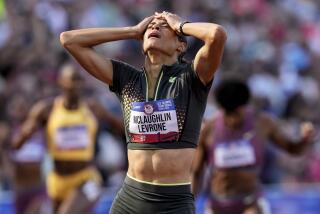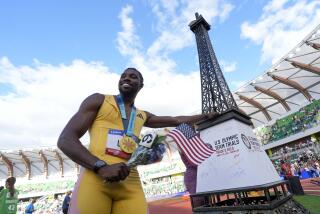U.S. OLYMPIC TRACK AND FIELD TRIALS : Reynolds Gets His Chance, Wins Heat in 400 Meters : Competition: After IAAF waives contamination rule, other top sprinters also run in preliminary round.
- Share via
NEW ORLEANS — Butch Reynolds, who won the right to race in the courts, won his 400-meter qualifying heat on Tuesday as he began his bid to earn a berth on the U.S. Olympic track and field team with his fastest time of the year.
Running under a Supreme court order and the grudging permission of the International Amateur Athletic Federation, Reynolds was timed in 44.58 seconds, about 1 1/2 seconds slower than his world record of 43.29.
Seven other runners--Danny Everett, Darnell Hall, Clarence Daniel, Raymond Pierre, Tony Miller, Daniel Fredericks and Anthuan Maybank--ran in the fourth and final heat of the event against Reynolds after the IAAF waived its “contamination” rule that would have penalized anyone running against him. All but Maybank qualified for the quarterfinals, scheduled for Tuesday night.
Reynolds, under suspension by the IAAF for alleged steroid use, fought his ban through the courts and obtained a Supreme Court order requiring The Athletics Congress, governing body for American track and field, to let him run in the event that selects the U.S. Olympic team.
He got off to a good start Tuesday, held his position through the first 200 meters and turned it on through the final stages to win comfortably. His time was the fifth-fastest in the world this year and the best time of the first round.
“I felt good,” Reynolds said. “This is only the beginning.”
Tuesday’s two heats in the 400, originally scheduled for Saturday, were postponed four times, delays that other quarter-milers said affected them.
“I think all my fizz was gone, said Aaron Payne, who qualified with a time of 45.95. “I was just going through the motions. It took a lot out of me, warming up, warming down, trying to prepare mentally.”
Joe Douglas, coach for both Everett and 1988 Olympic gold medalist Steve Lewis, said it would be impossible to judge the effect of the controversy on his runners. Everett ran 45.09, second-fastest time of the first-round running in the same heat with Reynolds.
Lewis ran 45.14 to win the first heat. Andrew Valmon ran 45.49 to win the second heat and Quincy Watts won the third in 45.35.
“We’ve just had to deal with it,” Douglas said. “We really won’t know until the Monday morning quarterbacks have their say.”
Willie Davenport, who made four Olympic teams as a hurdler and one as a member of the bobsled team, said runners have faced worse travails than a series of delayed heats.
“People got killed in Munich in 1972, and we had to run the next day,” said Davenport, a gold medalist in 1968 and bronze medal winner in 1976. He made the team in 1964 and did not place, and he ran fourth in 1972.
Jeff Reynolds, Butch’s younger brother, barely qualified for the second round with a time of 46.09.
“Since I was in the middle of it, it was OK for me,” Jeff Reynolds said. “The first day threw me off, but after that, I knew what to expect.’
Butch Reynolds said before the race that he talked with other quarter-milers about his situation and his fight to run.
“They did not all support the stand I made, but they respected the stand I made,” he said. “Three more days, and we’re in.”
The field will be cut to eight after a semifinal heat on Wednesday, and the finals are scheduled for Friday night.
The statement from the governing body of world track and field said, “The IAAF Council decides to exceptionally waive the application of IAAF rules 53.1 (ii) in the case of 400 meters event at the U.S. Olympic Track and Field Trials in New Orleans.”
Reynolds was suspended August, 1990, for two years after allegedly testing positive for steroids. He says he is innocent and that his court victories prove it. He has filed a $12.5 million damage suit against TAC and the IAAF.
He won a Supreme Court ruling last week that allowed him to compete in the trials despite the IAAF’s insistence he won’t be allowed to run in the Barcelona Olympic Games.
“Regardless of the athlete Reynolds’ eventual placing in the U.S. Olympic trials, he will, in no way, be eligible to compete in the Olympic Games in Barcelona in as much as this event takes place before his suspension period expires,” the IAAF statement said.
“The IAAF said he couldn’t run here, either,” said Brad Hunt, Reynolds’ agent.
In addition to its decision to suspend the contamination rule, the IAAF called on the U.S. Olympic Committee and The Athletics Congress, U.S. track’s governing body, to petition the U.S. government to legislate to “prevent civil courts from acting in the matters of amateur sports activities.”
Earlier, a Federal court in Columbus, Ohio, ruled that Reynolds should be allowed to compete in New Orleans.
His suspension expires three days after the end of the Olympics on Aug. 9.
Reynolds won his first victory in his 21-month fight after TAC’s Athletes Advisory Committee investigated the testing procedure that resulted in the suspension and found numerous irregularities.
Documents are missing showing who had possession of the urine samples and when they had them. The samples were shipped without tamper-proof seals.
The laboratory conducting the tests had a history of problems, and part of the testing equipment failed during a key test of Reynolds’s sample.
Further, Reynolds had another test done a week after he allegedly failed the test in Europe, and the second analysis--10 times more sensitive--showed no traces of banned substances.
On the recommendation of the advisory committee, TAC recommended to the IAAF that Reynolds’ suspension should be lifted.
The IAAF refused to bend, and the lengthy court battle began.
Reynolds ran in five meets under a series of court orders, and he met the qualifying standard for the trials in one of those meets in San Francisco in May.
More to Read
Go beyond the scoreboard
Get the latest on L.A.'s teams in the daily Sports Report newsletter.
You may occasionally receive promotional content from the Los Angeles Times.






